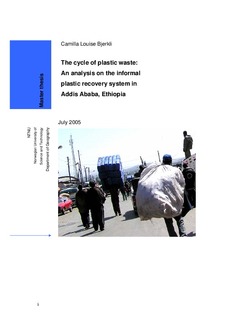The cycle of plastic waste: An analysis on the informal plastic recovery system in Addis Ababa, Ethiopia
Master thesis
Permanent lenke
http://hdl.handle.net/11250/242601Utgivelsesdato
2005Metadata
Vis full innførselSamlinger
Sammendrag
This study deals with the informal plastic recovery system in Addis Ababa. The purpose of this thesis is to explore the organization and the actors involved in the system. Further, the thesis attempts to estimate the size of the informal sector, the amount of materials collected, the quality of the materials, and the economic aspects of the activities. This is followed by a discussion on the strengths and the barriers that the system faces today. In order to gain a holistic overview of the plastic recovery system, the formal solid waste management system and the private sector involvement in solid waste are described since they form an integral part of the system.
Structuration theory and an actor-oriented approach have been used, based on the interaction between the structures and the actors within the system, in order to explain why actors within the system act in the way that they do and why the system has developed in the way it has. Since this thesis is the first study on the informal plastic recovery system in Addis Ababa, the data used is mainly primary data collected during the fieldwork. Both qualitative and quantitative methodologies were used to gain a broader understanding of the system and the activities involved, and to increase the validity of the data.
This study has shown that thousands of individuals in Addis Ababa are dependent on the recovery of plastic materials in order to make a living. Moreover, the activities have showed to be economically profitable and to play an important role in solid waste management. It is argued that a lack of a formal system for the recovery of plastic materials has made it possible for the informal sector to fill the gap that the government does not fill. Further, the government’s lack of awareness of the informal sector has made it possible for the recovery system to develop without interference. The governmental ignorance of the informal plastic recovery system as well as civil society’s lack of trust and creditability in the government has proven to be one of the main difficulties confronting the plastic recovery system. Because of this, every attempt from the governmental side to implement new strategies within the system seems to fail, since they do not consider or consult the decisions with actors involved at the local level. The thesis highlights that it is essential that the government starts to recognize the informal sector and tries to gain their trust and credibility in order to improve the overall solid waste management system in Addis Ababa.
